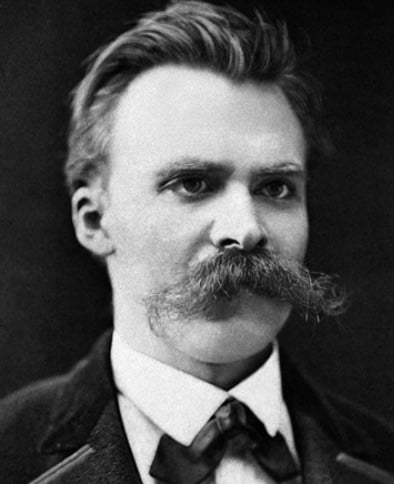
Friedrich Nietzsche was born on October 15, 1844, in Röcken, a small village in Prussia, now part of Germany. He was the son of a Lutheran pastor and had a sister named Elisabeth. In 1854, he entered the Domgymnasium in Naumburg and was subsequently offered a scholarship at the prestigious Schulpforta, because his father had served as a pastor for the state. There, he acquired fluency in Greek, Latin and Hebrew that enabled him to read the original documents that underpinned the Judeo-Christian traditions. On graduation from Schulpforta in 1864, Nietzsche enrolled at the University of Bonn where he studied classical philology (the study of ancient languages and texts) and later attended the University of Leipzig. His interest in the works of Greek philosophers, especially the writings of Heraclitus and Plato, would later influence his philosophical thinking.
In June 1864, at the age of 20, Friedrich Nietzsche renounced his faith, stating, “Hence the ways of men part: if you wish to strive for peace of soul and pleasure, then believe; if you wish to be a devotee of truth, then inquire.” His insights into the ancient texts had enabled him to research the sources of faith and set out on his own search for truth, unencumbered by early indoctrination.
Nietzsche became a professor of classical philology at the University of Basel in Switzerland at the young age of 24. During his time there, he developed an interest in philosophy and began to question the prevailing philosophical and moral ideas of his time. His most famous works include “Thus Spoke Zarathustra,” “Beyond Good and Evil,” “The Birth of Tragedy,” “On the Genealogy of Morality,” and “Ecce Homo.” These writings often critiqued traditional Christian morality and explored the concept of the “Übermensch” (Overman or Superman), emphasizing the individual’s will to power and creativity.
Nietzsche’s health deteriorated significantly in his later years, and in 1879 he resigned from his professorship at the University of Basel. During the 1880’s, he suffered from various physical and mental health problems, including migraines and vision problems, that culminated, in 1889, in a complete mental breakdown and dementia. After his debilitation, Nietzsche’s sister, Elisabeth Förster-Nietzsche, edited and published some of his works, promoting a distorted and nationalistic interpretation of his philosophy. After spending the last years of his life in the care of his mother and then his sister, Friedrich Nietzsche died from pneumonia on August 25, 1900, in Weimar, Germany.
Nietzsche’s writings have been the subject of both admiration and criticism. His ideas on the “will to power,” the rejection of traditional morality, and his critique of religion have been interpreted in various ways and have sparked many debates. Nietzsche is often associated with existentialism and is considered one of the key figures in postmodern thought. His insights have had a profound impact on modern philosophy, literature, psychology, and art, inspiring countless philosophers, writers, and artists.
Expressing the difficulties faced by autonomous thinkers, we once observed: The individual has always had to struggle to keep from being overwhelmed by the tribe. If you try it, you will be lonely often, and sometimes frightened. But no price is too high to pay for the privilege of owning yourself.
